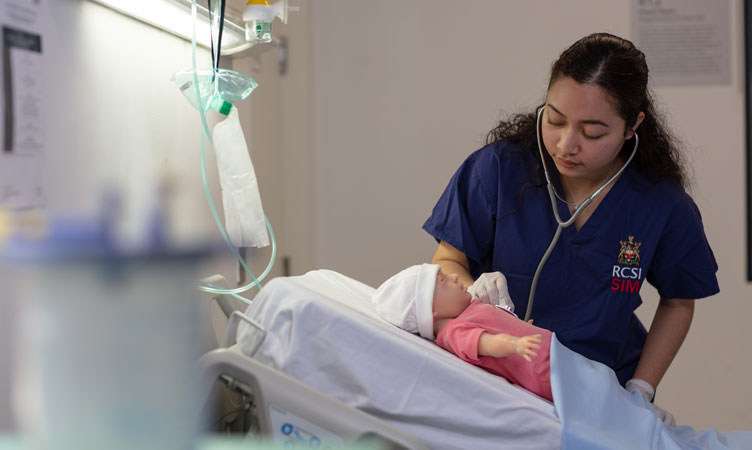Would you like to be on a pilot’s first-ever flight? Or what about being a doctor’s first-ever patient?
Before simulation training became commonplace, many of us might have politely declined. But today, simulation training and education means that professionals who hold our lives in their hands – like pilots or medical professionals – are highly experienced before they begin their careers.
One of Europe’s most modern and advanced clinical simulation training facilities, RCSI SIM, is located in RCSI’s Dublin campus. It is widely regarded as one of the university’s greatest strengths, with its long-established facility running everything from basic skills training to complex, high-fidelity team simulations that mirror real-life hospital scenarios.
Here, Professor Claire Condron, Professor of Simulation Education and Director of the RCSI SIM Centre, and Professor Fiona Kent, Deputy Director of the Health Professions Education Centre, are leading the Simulation Programme for Interprofessional Readiness and Immersive Training (SPIRIT), a collaborative Erasmus+ initiative to improve health professions education through simulation-based training.
Collaborative programme
RCSI’s Insights and Planning Office helped to bring together the group of four medical universities, all associate partners to the European University Alliance for Global Health (EUGLOH), to work on projects to support a healthier and more resilient world.
All of the universities involved, which include Humanitas University (Italy), the Medical University of Vienna (Austria) and Wrocław Medical University (Poland) have significant simulation education programmes, so a natural collaboration for a simulation education programme was developed.
All had identified a similar issue: high-quality simulation depends on trained educators and highly specific skills. So, could they combine their strengths to improve immersive, high-quality simulation-based learning to benefit both patients and medical professionals?
Development and evaluation
The main focus of the project was to develop interprofessional education, bringing together students from different healthcare areas including medicine, nursing, pharmacy and physiotherapy to learn with, from and about each other. In college, they are often trained separately which can create silos; in the real world, they work side-by-side every day.
Simulation training, bringing together different health professionals, helps to break down these barriers. Students get to experience realistic, hands-on scenarios where they can practice working together in a safe, controlled environment.
It sounds great, but it only works if the educators running the simulations know how to design and guide effective interprofessionals sessions.
With this in mind, the SPIRIT project is focused on developing and improving the specific skills to ensure the best possible simulation training. Some participants have been leading simulation programmes for years – training students and staff, developing different scenarios and evaluating outcomes. Others bring expertise in new technologies, including virtual and augmented reality.
The team is drawing on a combination of best practices, refined over time, on how to debrief effectively, how to structure scenarios for interprofessional groups and how to train facilitators who may not come from a simulation background. They are also looking at educator development using hybrid delivery of a 10 ECTS course, ensuring that the people running the sessions are confident, capable and supported.
Meaningful communication
A project like SPIRIT is not without challenges. Students may have different languages, priorities and confidence levels. A good clinician does not necessarily make a good educator. And simulation takes time, resources and buy-in from leadership.
Finally, there is a longer-term, more significant goal for SPIRIT: how to make simulation education truly and meaningfully interprofessional. This involves ensuring learners understand communication styles, team dynamics and the unspoken hierarchies in healthcare.
And could there be new ways to assess performance and outcomes in interprofessional focused simulations? We may be about to find out.

Funding for SPIRIT was provided through the Erasmus+ initiative.
RCSI is committed to achieving a better and more sustainable future through the UN Sustainable Development Goals.
![]()
![]()
![]()


